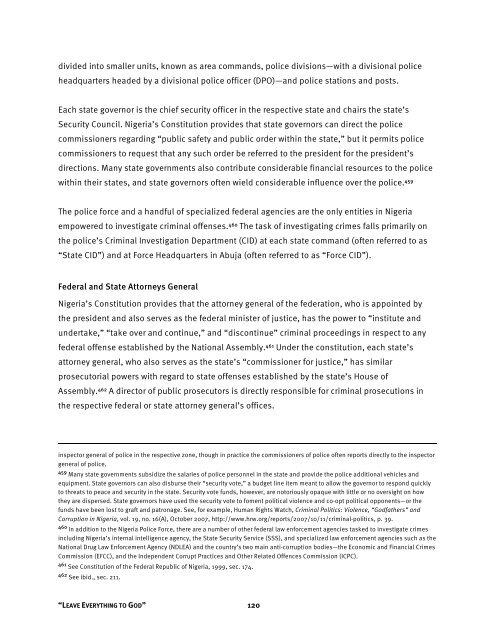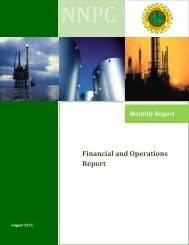You also want an ePaper? Increase the reach of your titles
YUMPU automatically turns print PDFs into web optimized ePapers that Google loves.
divided into smaller units, known as area commands, police divisions—with a divisional police<br />
headquarters headed by a divisional police officer (DPO)—and police stations and posts.<br />
Each state governor is the chief security officer in the respective state and chairs the state’s<br />
Security Council. Nigeria’s Constitution provides that state governors can direct the police<br />
commissioners regarding “public safety and public order within the state,” but it permits police<br />
commissioners to request that any such order be referred to the president for the president’s<br />
directions. Many state governments also contribute considerable financial resources to the police<br />
within their states, and state governors often wield considerable influence over the police. 459<br />
The police force and a handful of specialized federal agencies are the only entities in Nigeria<br />
empowered to investigate criminal offenses. 460 The task of investigating crimes falls primarily on<br />
the police’s Criminal Investigation Department (CID) at each state command (often referred to as<br />
“State CID”) and at Force Headquarters in Abuja (often referred to as “Force CID”).<br />
Federal and State Attorneys General<br />
Nigeria’s Constitution provides that the attorney general of the federation, who is appointed by<br />
the president and also serves as the federal minister of justice, has the power to “institute and<br />
undertake,” “take over and continue,” and “discontinue” criminal proceedings in respect to any<br />
federal offense established by the National Assembly. 461 Under the constitution, each state’s<br />
attorney general, who also serves as the state’s “commissioner for justice,” has similar<br />
prosecutorial powers with regard to state offenses established by the state’s House of<br />
Assembly. 462 A director of public prosecutors is directly responsible for criminal prosecutions in<br />
the respective federal or state attorney general’s offices.<br />
inspector general of police in the respective zone, though in practice the commissioners of police often reports directly to the inspector<br />
general of police.<br />
459 Many state governments subsidize the salaries of police personnel in the state and provide the police additional vehicles and<br />
equipment. State governors can also disburse their “security vote,” a budget line item meant to allow the governor to respond quickly<br />
to threats to peace and security in the state. Security vote funds, however, are notoriously opaque with little or no oversight on how<br />
they are dispersed. State governors have used the security vote to foment political violence and co-opt political opponents—or the<br />
funds have been lost to graft and patronage. See, for example, Human Rights Watch, Criminal Politics: Violence, “Godfathers” and<br />
Corruption in Nigeria, vol. 19, no. 16(A), October 2007, http://www.hrw.org/reports/2007/10/11/criminal-politics, p. 39.<br />
460 In addition to the Nigeria Police Force, there are a number of other federal law enforcement agencies tasked to investigate crimes<br />
including Nigeria’s internal intelligence agency, the State Security Service (SSS), and specialized law enforcement agencies such as the<br />
National Drug Law Enforcement Agency (NDLEA) and the country’s two main anti-corruption bodies—the Economic and Financial Crimes<br />
Commission (EFCC), and the Independent Corrupt Practices and Other Related Offences Commission (ICPC).<br />
461 See Constitution of the Federal Republic of Nigeria, 1999, sec. 174.<br />
462 See ibid., sec. 211.<br />
“LEAVE EVERYTHING TO GOD” 120




